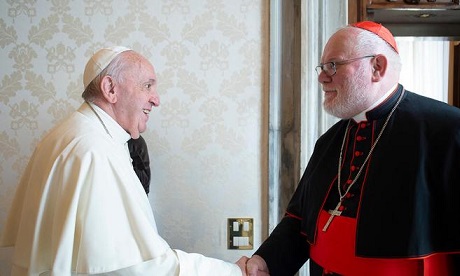Pope Francis has written declining German Cardinal Reinhard Marx’s 21 May letter of resignation.
In his letter Francis says he agrees with Marx that Catholic leaders cannot adopt an “ostrich policy” in the face of the clerical sexual abuse crisis.
“If you are tempted to think that, by confirming your mission and not accepting your resignation, this Bishop of Rome (your brother who loves you) does not understand you, think of what Peter felt before the Lord when, in his own way, he presented him with his resignation: ‘Depart from me, for I am a sinner,’ and listen to the answer: ‘Shepherd my sheep.’”
“I am moved by the comprehensiveness and the very brotherly tone of his letter and feel how much he understands and has accepted my request. In obedience I accept his decision as I promised him,” says Marx.
Nonetheless, he says he is finding the pope’s decision to be a great challenge.
“After that, simply going back to the agenda cannot be the way for me and also not for the archdiocese,” he says.
Rather than stick with the status quo, Marx says he plans to reflect on “what new ways we can go – even in the face of a history of multiple failures – to proclaim and witness to the Gospel” in the Munich archdiocese.
“The bishop [Francis] is not alone in this and in the next few weeks I will think about how we can together contribute even more to the renewal of the Church here in our archdiocese and as a whole; because the pope takes up much of what I mentioned in my letter to him and gives us important impulses.
“What I also underlined in my declaration remains: that I have to bear personal responsibility and also have an ‘institutional responsibility,’ especially in view of those affected [by clerical sexual abuse], whose perspective needs to be included even more effectively.”
Catholic commentator Robert Mickens says Francis’s refusal to accept Marx’s letter of resignation will be a major blow to doctrinal hardliners, neo-traditionalists and the Catholic Church’s “no change” crowd.
Marx is “one of the most energetic and forceful proponents of ecclesial reform through synodality, a process of wide-ranging consultation of all the Church’s members that Francis is trying to make constitutive of Roman Catholicism,” Mickens says.
German bishops’ conference chairman Bishop Georg Bätzing and Thomas Sternberg, president of the influential lay Central Committee of German Catholics, are pleased Marx won’t be resigning.
Sternberg says Francis’s letter of resignation showed “that the alleged dissatisfaction with the ‘Synodal Way’ in Germany does not correspond to the multi-layered reality.”
He was referring to the controversial multi-year process bringing together bishops and lay people to discuss four main topics: the way power is exercised in the Church; sexual morality; the priesthood; and the role of women.
Marx himself has not been accused of abuse but says he must bear personal responsibility as well as bear an “institutional responsibility” for the church’s handling of clergy sexual abuse.
On May 31, CathNews reported Pope Francis ordered an apostolic visitation of the Archdiocese of Cologne, in Germany, to examine the pastoral situation and the handling of sexual abuse cases.
The archdiocese said that the pope’s apostolic visitors would evaluate “possible mistakes” made by its leader, Cardinal Rainer Maria Woelki.
Woelki has faced calls to resign since the archdiocese controversially declined to publish a report by the Munich law firm Westphal Spilker Wastl.
Source
Additional reading



